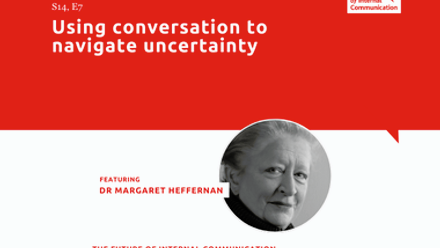For anyone working in internal communication, the insights contained within the inaugural IC Index 2023 are long overdue.
This research, conducted by the Institute of Internal Communication in partnership with Ipsos Karian and Box, yields key points of professional validation.
And given the complexity of labour market dynamics in 2023, this isn’t a moment too soon.
Internal communication makes a big difference
The IC Index is a first-of-its-kind UK-wide study to understand the role effective internal communication plays in our working lives. Surveying 3,000 employees within organisations of more than 500 staff, researchers found almost two-thirds of respondents felt internal communication makes a positive difference to employee engagement.
This, unsurprisingly, has a knock-on effect, yielding higher trust in CEO communication and reduced employee flight risk.
For the first time, we have objective evidence to showcase the vital difference a dedicated internal communication function makes to business performance.
At a point in time when the impacts of Brexit, a global pandemic, Russia’s invasion of Ukraine and escalating supply chain issues are converging to create economic maelstrom, this is key.
Six in ten workers are ‘quietly quitting’
According to Gallup’s State of the Global Workplace 2023 report, low engagement is estimated to cost the global economy some $8.8 trillion (ca. £6.83 trillion). The same research suggests as many as six in ten workers are ‘quietly quitting’ – doing no more than the bare minimum required of them.
While the reasons for such low levels of engagement are, of course, contextual and nuanced, the fact remains that successful innovation and problem-solving – never more needed by organisations facing down increasing complexity – rely on the diverse perspectives of the many.
Gallup’s research reveals key areas quiet quitters say would make a difference to waning levels of engagement.
These have far more to do with culture than pay and benefits. Of the various means by which organisational culture could be improved, internal communication comes through as a primary point of influence. Having clearer goals and stronger guidance, wider recognition of individual contribution, and improved direct dialogue with line managers are cited as key areas that would make a difference.
This intersects with the findings of the IC Index. While just over half of respondents felt their employers did a good job of communicating strategy, there’s still much room for improvement.
Alignment is key
Only 45% of poll respondents felt clear on their organisation’s strategy, which for any executive team is surely mission critical. When external operating environments are increasingly ambiguous and volatile, it’s never been more important that staff feel connected to and motivated by clearly defined goals and objectives.
There’s another bonus here. It turns out a clearly communicated and well understood organisational strategy is a key driver in advocating for one’s employer as a great place to work – vital in what continues to be one of the most tumultuous labour markets since WWII.
Managers need help
A further striking link between the IC Index and Gallup’s data pertains to line manager communication. Gallup identifies the manager as “the linchpin of engagement”, but its data shows a primary complaint is that employees don’t feel their manager is approachable enough to talk openly with.
This is important. The IC Index reveals line manager communication to have more impact than CEO communication. Simply put, there’s greater trust for direct managers than for senior executives, who can sometimes feel distant and even dislocated.
Again, here the opportunity for internal communication is substantial.
Managers need our help. Given the social and economic turmoil of the past few years, anyone could be forgiven for beginning to flounder. But the fact is, external affairs are unlikely to settle down soon.
Teams and organisations need world-class internal communication like never before, and this transcends the written word.
As the IC Index shows, regular 1-2-1 meetings foster trust and goodwill, wellbeing and a sense of team cohesion. But tragically, more than a third of line managers currently feel ill-equipped to lead a conversation with their team.
This is unsurprising. After prolonged periods of social isolation and arguably one of the most challenging scenarios to occur in peacetime, we all need help in re-finding our ability to engage in inclusive, empathic communication. In organisational settings, this is vital for the betterment of the group at large.
Managers need you
This is where internal communicators can, and must, step in.
Organisations of all stripes urgently need communication champions to role-model what exemplary communication looks, sounds and feels like.
As the convergent challenges of the coming decade continue to perplex, conversation will be the critical cornerstone of community cohesion. Across the board, colleagues need our help to complement their digital capabilities with bridge-building relational ones.
Robust internal communication sits at the heart of this. The future of work depends on it.







